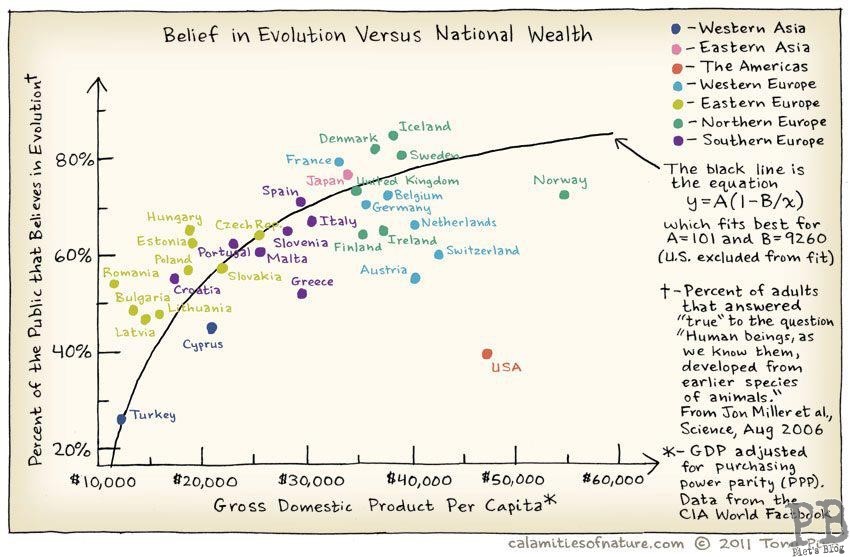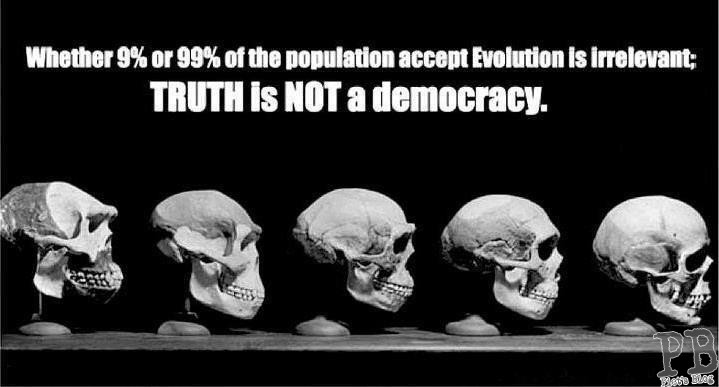When looking at the chart comparing national wealth with belief in evolution, one country stands out in a troubling way: the United States. Among the wealthiest nations in the world, the U.S. ranks near the bottom in terms of belief in evolution. Only around 40% of the U.S. population answered “true” to the statement: “Human beings, as we know them, developed from earlier species of animals.” This puts the U.S. far behind its economic peers and even behind many countries with significantly lower GDP per capita.
But what’s even more concerning is that the U.S. is not alone. Other relatively wealthy nations such as Cyprus, Latvia, and Turkey also score alarmingly low on this scale. Still, the U.S. is a special case. It is the only country among the wealthiest to have such a large percentage of the population reject evolution—a position largely informed by religious conviction rather than scientific inquiry.
The core of the problem lies in a persistent tension between science and faith—particularly within Christian communities in the U.S., where a literal interpretation of the Bible often clashes with modern scientific understanding. According to a Pew Research Center study, about 40% of Americans believe that “God created humans in their present form within the last 10,000 years.” This is what’s known as Young Earth Creationism, and it directly contradicts not just the theory of evolution, but a vast range of scientific disciplines including genetics, geology, and paleontology.
In many American school districts, especially in the South and Midwest, there have been ongoing debates about whether evolution should be taught at all, or whether it should be taught alongside so-called “alternative theories” like Intelligent Design. These debates are often fueled not by scientists, but by religious groups and political actors seeking to uphold a worldview that places scripture above scientific evidence.
What makes the situation even more paradoxical is that the U.S. is home to some of the world’s leading universities, research institutions, and biotech firms. American scientists have been at the forefront of evolutionary biology for decades. Yet, a large part of the public remains skeptical or outright dismissive of the concept.
So, why is evolution so hard for some to accept?
The comedian and outspoken atheist Ricky Gervais has a way of cutting to the core of this issue with humor and clarity. One of his most widely shared quotes on evolution is:
“Science is constantly proved all the time. If you take something like evolution, it is a theory—at least the way scientists use the word, which means it’s a hypothesis backed by evidence. It’s not a guess. People say, ‘Oh, it’s just a theory.’ Yeah, like gravity is a theory.”
Gervais has often spoken about how frustrating it is that the word “theory” is misunderstood in everyday language. In scientific terms, a theory is not a wild guess but a comprehensive explanation of facts based on evidence. The theory of evolution is supported by over 150 years of research, encompassing fossil records, molecular biology, comparative anatomy, and more.
In another interview, Gervais remarked:
“I love how people say, ‘Why is there still monkeys if we came from monkeys?’ That’s like saying, ‘Why is there still Italians if I came from Italian ancestors?’”
Through satire and wit, Gervais exposes the flawed reasoning that often underpins resistance to evolution. It’s not that the scientific evidence is lacking—it’s that the acceptance of that evidence challenges deeply held beliefs about human identity, purpose, and divine creation.
Back to the chart: the black curve shows a strong positive correlation between national wealth and belief in evolution. As countries become wealthier and more educated, belief in evolution tends to rise. But the U.S. is a stark outlier—suggesting that wealth alone doesn’t determine acceptance of science. Cultural and religious factors matter greatly.
So where do we go from here?
Education, critical thinking, and open dialogue remain key. Science communication needs to be clearer and more emotionally resonant. We need to respect personal beliefs while defending scientific literacy as a cornerstone of modern society.
It’s ironic, really. Evolution is not just a scientific theory—it is a story of survival, of adaptation, and of change. And in a world facing climate crises, pandemics, and rapid technological transformation, our ability to evolve—intellectually and socially—has never been more important.
The fact that so many still resist evolution isn’t just a quirk of public opinion. It’s a reflection of how we value science, how we educate our children, and how we navigate the space between faith and reason.
As Gervais quips:
“You don’t believe in evolution? So you’re telling me that Noah got two of every animal—including the parasitic wasp, which lays eggs in a caterpillar, and the larvae eat the host alive from the inside out—and that’s part of your loving God’s plan?”
It’s meant to provoke a laugh, but also a thought. Science doesn’t have all the answers. But it asks questions. It investigates. It corrects itself. That’s what makes it powerful—and worth believing in.






